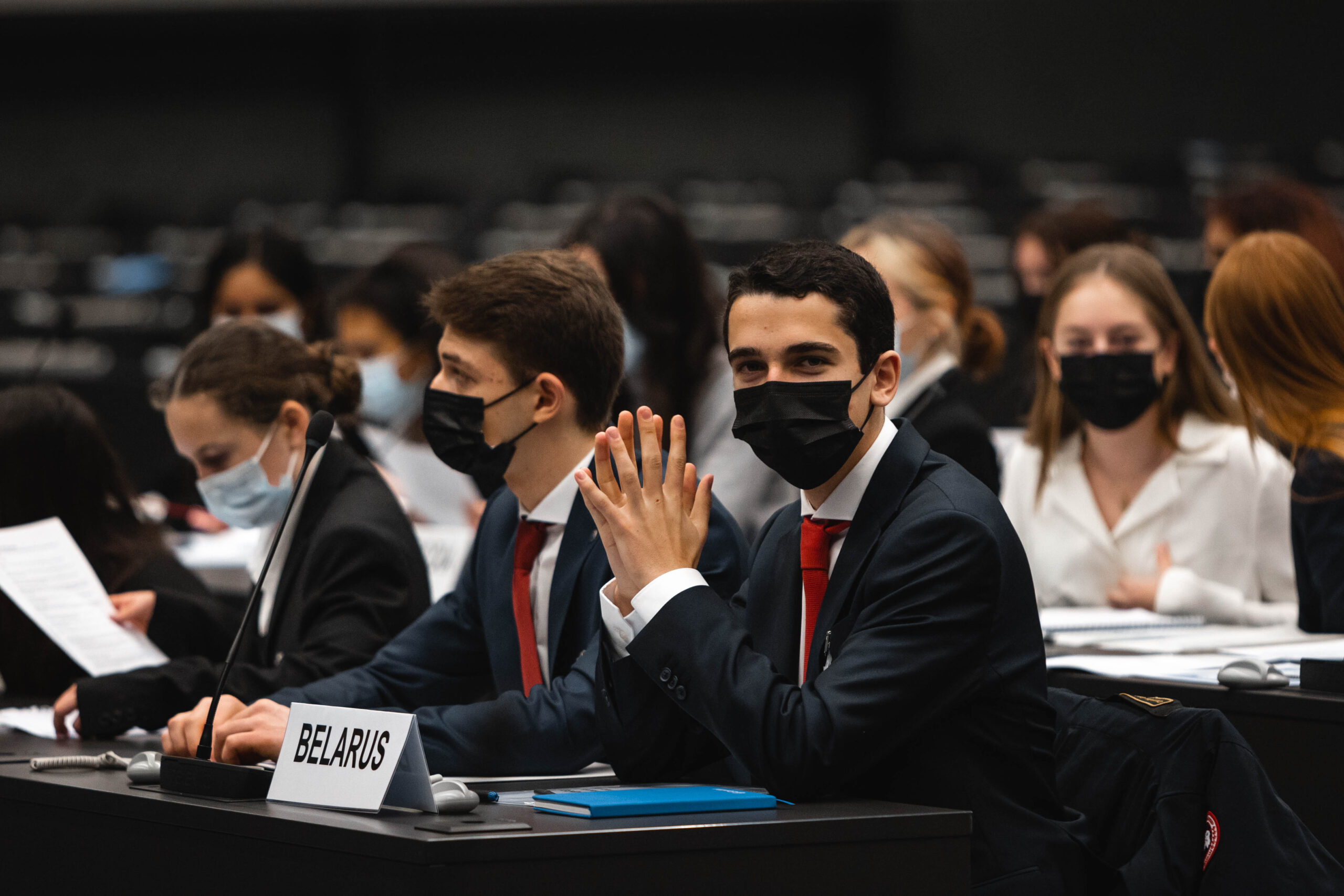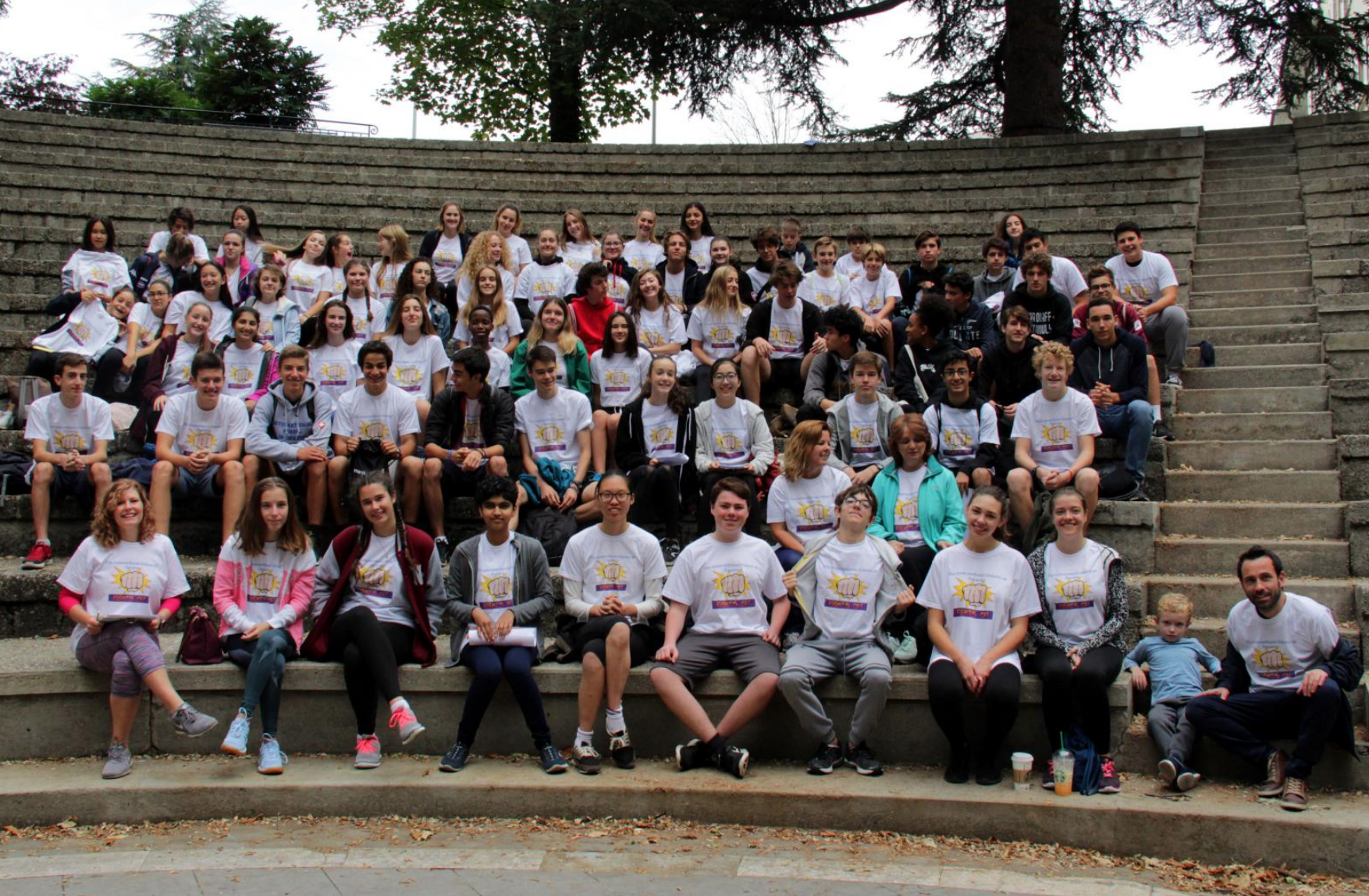By Owen Button, Y13
Monday, December 12th, 2022 marks Ecolint’s notable return to Student League of Nations, held at the Palais de Nations in Geneva, after a notable hiatus due to COVID-19. The assembly on Monday aims to determine an ultimatum on three resolutions proposed by the Ukraine, the Republic of Chile, and the United Mexican States; the first of these aims to establish a new body concerned with the protection of human rights; the second concerning a proposed exclusion zone around the Antarctic continent; and the final proposing new policy on the illicit transfer of small arms.
11:40 CET, December 12, 2022
The assembly commenced with the resolution proposed by the delegation of Ukraine proposing a new body under the Office of the High Commissioner for Human Rights, which would be known as the Human Rights Enforcement Committee or HREC. Envisioned as a type of rapid-response force for the Human Rights Committee (HRC), the organization would investigate alleged violations of human rights within UN Member States and more specifically, the suppression of the right of citizens to peacefully assemble or protest. Forms of response would range from sanctions to armed intervention; the need for intervention would be determined by a 5/6 majority vote in a UN assembly and would ultimately be decided by the National Security Council.

The proposed resolution would see immediate support in the form of the United Kingdom, who would go on to express further support of Ukraine in its fight against the Russian Federation. This sentiment would be expressed further by a handful of other nations, most notably the Republic of Latvia and the nation of Kosovo, who both cited the need for the protection of human rights in their own histories. Switzerland would likewise express support for the referendum, highlighting its own commitment to free speech in other nations.
Opposition to the resolution varied drastically, ranging from light critiques and proposed amendments to deep inquiries regarding Ukraines intentions. The Israeli delegation expressed concerns over a small number of proposed interventions targeting individual state leaders, going on to cite the need for due process in such an action. The delegation from Rwanda inquired as to whether the issue truly necessitated a new organization, and if the same objective could be achieved by expanding the responsibilities of the HRC, which Ukraine argued lacked the authority to execute the necessary actions.

Stronger opposition to the resolution would come initially in the form of Belarus and Russia, with the former highlighting the dangers of overbearing western influence on eastern countries and accusing Ukraine of the genocide of ethnic Russians in the Donbas region, and the latter describing its military operations in the region a protection of the rights of its citizens. Russia went on to express disdain with anti-Russian sentiment within the UN and cited past limits on free speech on the part of Ukraine. On this latter point, Ukraine admitted to ‘darker times’ in its own history and highlighted Russian influence in those restrictions at the time.
Surprisingly vocal resistance to the resolution would come in the form of Singapore, who cited concerns about inefficiency and slow response time with the proposed HREC and addressed the issue of national sovereignty, a topic that would be further discussed by the nations of Iran and Myanmar. The two latter nations both argued that such action by the UN would violate the rights of individual nation states to deal with their own issues, and while this would be denied by Ukraine, they would go on to voice further concerns about the utilization of the organization as a political weapon by the West, chiefly the United States (the US would uncharacteristically not respond to this allegation).
The coercion of western ideals onto sovereign states with differing values would ultimately be the deciding issue in the referendum, and despite a trio of major amendments made before the vote, Ukraine’s resolution would ultimately be rejected by the general assembly, with 33 nations opposed, 27 in favor, and 13 abstaining.
13:00 CET, December 12, 2022
The second resolution, proposed by the Republic of Chile, dealt with the nearing expiration of the Antarctic Treaty intended to prevent territorial claims on the continent. The resolution noted the negative impacts on the environment allegedly due to human activity in the region and proposed an organization, titled the United Nations Antarctic Council (UNAC), that would be tasked with managing human activity on the continent, with the ultimate goal of ceasing all human activity on Antarctica by 2048 with the notable exception of single-day tourism. The Chilean delegation cited the importance of removing human presence from the continent primarily due to the impact of global warming in the form of rising sea levels and a hypothetical future conflict on the landmass.

Opposition to the resolution was unilaterally unanimous and was centered primarily around three major issues: research, authority, and tourism. The former issue was proposed initially by the delegation from the Australian Commonwealth, who observed that banning all human activity in Antarctica would not solve the listed global issues due to their wider scale. Likewise, they noted the importance of Antarctic research for the benefit of humanity and supported a reimagined variant of the original Antarctic Treaty. This sentiment would be further expressed by Belarus, Vietnam, Bolivia, South Africa, Norway, Finland, and Israel, who also specifically argued for the banning of tourism and fishing from the continent.


A number of other countries, notably France, Germany, India, and Peru, expressed support for the treaty, albeit with amendments to the policies surrounding tourism and research, the latter of which was deemed to be necessary to future international progress, despite Chile’s claims that the former was less harmful to the environment.
The issue of authority in dealing with Antarctic affairs was the final one discussed in the assembly, with New Zealand initiating the debate by arguing that only Pacific states, which it argued were the most affected by rising sea levels, should have jurisdiction in affairs, a proposal that was quickly rejected by Gambia and Morocco, who argued that many other coastal nations are affected by rising sea levels.
Ultimately, in a similar situation to that of Ukraine’s proposal, despite a number of minor amendments regarding the establishment of an international research station on the continent and the banning of tourism, the resolution was rejected by the general assembly, with 20 nations in favor, 37 opposed, and 16 abstaining.
16:30 CET, December 12, 2022
After a brief lunch recess, the assembly reconvened at 14:15 for its third proposal of the day. The resolution, advanced by the delegation from the United States of Mexico, aimed to address the international black market for small arms and light weapons (SALW) through a universal tracking system. The standardized tracing network, it was explained, would ideally allow the international community to track down, isolate, and ultimately eliminate the fundamental threat posed by the traffickers themselves. While the Mexican delegation made it clear that participation in the system would be entirely voluntary, it strongly urged all nations within the assembly to become signatories to the resolution.

Early debate regarding the resolution was mixed. Ireland would begin discussion by siding in favor of the resolution, yet its strong stance against the general use of firearms quickly came under fire from the Belarusian delegation, who questioned Ireland as to whether weapons or humans were responsible for violence. The Irish delegation went on to argue that weapons in the hands of humans were ultimately to blame. Further resistance came in the form of the Kingdom of Sweden, who cited the fact that issues relating to gun violence often vary drastically between nations and ultimately argued that nations capable of managing their issues domestically should not be forced to fund a program that they themselves did not necessitate. While the point would ultimately be rebuffed by both the Mexican and Czech delegations, who pointed out the objectives outlined in the UN Sustainable Development goals and their global nature, the negative sentiment would ultimately be shared by many of Sweden’s northern neighbors, most notably the Kingdoms of Norway and Denmark.
Although questions regarding the resolution’s effectiveness still circulated throughout the debate, the Mexican proposal saw a wide range of support as the assembly wore on. While much of this solidarity came from less economically-advantaged nations more heavily impacted by the crisis, such as Colombia, Honduras, Afghanistan, and Somalia, a substantial number of larger countries also voiced support for the program, including Turkey, Argentina, and the United States.

The participation of the latter quickly drew the ire of a number of delegations, many of whom cited the nation’s troubled relationship with SALWs. Rwanda most notably accused the US of hypocrisy in supporting the referendum, citing its role in the historical destabilization of African nations that ultimately led to the prevalence of illegal gun trafficking on the continent. The American delegation apologetically acknowledged the nation’s previous actions and emphasized the fact that by supporting the resolution, it was attempting to correct those mistakes, a point that the delegation went on to reiterate several times throughout the rest of the assembly.

In spite of this sporadic criticism of one of the initiative’s chief proponents, the resolution managed to gather an unprecedented assemblage of bipartisan support before the deciding vote; most notably, both the Ukrainian and Russian delegations voiced support for the program, along with a number of their political allies. This was potentially due, in part, to the willingness of the Mexican delegation to accept a number of proposed amendments to the resolution, including the creation of a judicial sub-body proposed by the Sri Lankan delegation, a restriction on cross-border good transfer proposed by the Russian Federation, and cost exemptions to states currently undergoing major crises, a change proposed by the Afghan and Ukrainian delegates. Despite these changes, it is worth noting that the Belarusian and Singaporean delegations still called into question the ability of the methods proposed in the program to meaningfully address the issue, citing previous studies. Nonetheless, the referendum was ultimately passed, with 57 nations voting in support of the resolution, 9 against, and 8 abstaining.
The vote determining the Mexican resolution likewise saw the slow, yet undeniable emergence of international alliances as a major political force within the general assembly. While the implications of such coalitions are difficult to see at the current moment, namely due to the widespread support of the referendum, it is likely that the largest of the new blocs; a merger between the African Union (OAU), Commonwealth of Nations, and Ukrainian allies; will prove to be a potent faction as the assembly enters its second day, although a growing alliance of Russian-backed nations may prove a formidable rival.
9:30 CET, December 13, 2022
Tuesday, December 13, 2022 marks the second day of the Ecolint SLN assembly, with the the Kingdom of Sweden starting the debate with a resolution intended to fortify the strength and integrity of the international criminal justice system by means of a subsidiary organization within the UN, followed by a proposal by Qatar aiming to ease the burden of the world’s growing food crisis. As described yesterday, expanding voting blocs are expected to play a major role today in the debate process. While this status of the super-coalition formed by the OAU and Commonwealth is currently unknown, a new coalition, named the Petrol Pact, has been established by the UAE, Nigeria, and Russia. The alliance aims to represent the interests of the world’s major oil-producing nations and is quickly gaining members, although it is worth noting that an anonymous source from the Nigerian delegation has accused the UAE of attempted bribery. Ultimately, the implications of these alliances on today’s political theater remain to be seen.

10:55 CET, December 13, 2022
After a slightly delayed start, the Swedish delegation opened discussion by describing their resolution: the establishment of a sub-organization under the UN Commission on Crime Prevention and Criminal Justice (CCPCJ), titled the International Office for Judicial Integrity (IOJI), for the purpose of combatting injustice within national legal systems. Under the new system, UN Member States would be assigned a team of IOJN analysts, with the number of analysts dependent on the population of respective states. The role of analysts would be to observe criminal cases within a country en masse, with more specific inspection paid to cases with unusual or outlying verdicts. In the event that the reviewed cases were unfairly conducted against the defendant, the case would be revisited by a CCPCJ court, with the UN verdict overriding the original adjudication. The assembly then took a recess during a brief address by the UN Geneva Director General, Tatiana Valovaya.

14:00 CET, December 13, 2022
After the Deputy-General answered a number of questions relating to the UN’s future plans in addressing a number of issues, the debate over the Swedish resolution recommenced with the US voicing its concerns about the effect of the organization on national sovereignty, citing the ability of the IOJI to overrule domestic cases in the event of a contradiction. Sweden’s reply that the program was “in [the US’s] best interest” did little to ease apprehensions within the rest of the chamber, and the delegations from Malaysia, Vietnam, and Iran echoed the sentiments of their American counterparts in expressing disdain at the potential reach and power of such an organization.
In a similar vein, the latter specified the idea that the IOJI analysts appointed to a nation might have little-to-no knowledge of that country’s culture and beliefs, and therefore might make decisions that do not align with those beliefs, citing the domestic chaos caused by what it called “western interference” in Iran’s national ideology. The delegation would go on to declare the Swedish resolution a political weapon of the west, who it further stated had no right to interfere with Iran’s religious policy. While the Iranian argument was supported by Afghanistan, as well as more cautiously by Tanzania and a resurgent Czechoslovakia, the Islamic Republic quickly came under fire for its growing domestic issues caused by its own legal policy.
Having learned from the resolutions that preceded their own, the Swedish delegation made it clear to the assembly early on in their proposal that they were open to amendments, a move that, while potentially weakening their international standing, nonetheless allowed them to effectively respond to the major wave of early criticism aimed at the IOJI. A South African suggestion to shift the organization’s functions into a more advisory role, despite Iranian criticism that this would make the body redundant, was positively received by many of the assembly’s constituents and emerged at the forefront of proposed changes to the Swedish resolution. A second potential amendment, submitted by Austria and Czechia, aimed to redirect much of the IOJI’s funding towards aiding Member States in eliminating corruption in their individual justice systems, a suggestion that went on to receive direct backing from the delegations of Australia, Mexico, and Uzbekistan.

Despite the nominal support the two proposed modifications received within the chamber, a small opposition group, led by Belarus, voiced disdain over the growing complexity of the program and questioned if it wouldn’t be more efficient to simply create a new resolution that directly addressed the assembly’s requirements.
The debate ultimately came to a head during the respective declarations of the Gambia and United Kingdom, representing the OAU and Commonwealth respectively. The two delegations proposed a series of several previously-agreed upon amendments to the Swedish proposal, most notably outlining a reduction in the IOJI’s authority and the more efficient allocation of the program’s funding. In addition, both blocs made it equally clear that their support for the resolution was entirely dependent on the acceptance of all requested amendments.

Forced to choose between accepting the structural changes to their resolution or risking a decisive loss of the assembly’s votes, the Kingdom of Sweden ultimately accepted the major amendment package, which included, in addition to the previously proposed modifications, an opt-out clause demanded in the final minutes of the debate by the Russian Federation that allowed Member States the right to refuse participation in the program. While these amendments ultimately led some to call into question the remaining power of the IOJI, they ultimately gave the Swedish delegation the support necessary to ensure the success of its resolution. The proposal was passed, with 47 nations voting in favor, 16 voting against, and 9 abstaining.

The debate for the IOJI resolution proved to be the first official action of the Trans-Continental Coalition (TCC): a joining of the African Union and the Commonwealth of Nations that represented more than 20 nations and close to a third of the assembly’s total votes. Due in part to the far more conserved posture taken by the delegations of the United States and China, as well as the failure of the Russian Federation to muster a rival bloc, the TCC quickly rose to become the most powerful political entity within the international forum, granting an influential voice to a group of historically under-represented nations.
16:45 CET, December 13, 2022
The final resolution discussed within the assembly was proposed by the Qatari delegation and aimed to address the growing global food crisis through the centralization of a number of managerial bodies within the UN under a single, new organization. Named the United Nations Agricultural Development and Management Organization, or UNADMO, the body would be tasked with coordinating a worldwide effort to maximize the production and transportation of global food products through the allocation of IFAD funding and the implementation of efficient farming methods, such as desalination and vertical farming. Likewise, the UNADMO would attempt to minimize the environmental impact of such a program, chiefly through the elimination of pesticides and unsustainable land-management practices.

While reception to the idea of a solution to the global food crisis was generally positive, the finer details of the Qatari motion quickly became a hotly debated subject. Despite voicing its overall support for the UNADMO’s ideals, the Portuguese delegation was not slow to raise the issue of funding, which it deemed too inadequate to effectively address the crisis. This was addressed in tandem with the case for level of financial contribution, which was opened by the representatives of Egypt and Croatia, with the latter suggesting that a nation’s contribution to the program should be dependent on its ability to contribute. Considering these two issues, the original clause outlining the required contribution of member states: a nonnegotiable 0.3% of GDP, quickly became the focal point of the debate. Contrary to the arguments of the Portuguese Republic, the delegation of Bosnia and Herzegovina suggested a decrease in the marked percentage, a sentiment shared by the Kingdom of Sweden, who uncharacteristically argued that the motion was too expensive. A number of countries likewise asked for reductions in their own spending. The Chinese delegation, after celebrating the nation’s past accomplishments in sustainable farming, demanded a reduction in their own spending, although they would quickly come under fire for the nation’s record of unsustainable fossil fuel use.

The delegation from Ukraine, while in support of “the spirit of the resolution”, similarly petitioned for an exemption in their spending, citing their importance as a global grain producer and their ongoing military struggles. Their request was ultimately sponsored by the United Kingdom, who paired a pledge for aid with a diplomatic strike aimed at the Russian Federation. The delegations of Belarus and Russia were quick to counterattack, accusing Ukraine of the destruction of grain ships bound for Africa, allegations that Ukraine was equally swift to deny.
Following international pressure to address the level of funding required by the UNADMO, the Qatari delegation voiced its intentions to add a bipartisan amendment to the resolution’s cost clause, and the forum turned its attention to the issue of artificial fertilizers and pesticides. The issue was initially raised by the Tanzanian delegation, who, in voicing their support for the Qatari motion, also expressed their concern for the environmental impact of chemical compounds in farming and supported the elimination of their use. While the delegation of Uzbekistan would offer solidarity with their Tanzanian counterparts on the issue, this preliminary sentiment was ultimately not widely shared, with opposition to the anti-pesticide policy materializing rapidly in the form of the Russian Federation. This argument would be further by the North Korean delegation, who expressed an uncharacteristic willingness to increase its trade with the rest of the world by means of the UNADMO, yet stressed the importance of pesticides on agricultural productivity.

Despite the controversial nature of the latter two parties, the case in defense of pesticide usage continued to grow, backed by the Republic of Indonesia and, instrumentally, by Kenya and Nigeria, whose shared stance represented that of many farming nations within the African Union. The latter’s final address to the assembly, a speech that (quoting the famous words of Ali Petochi) emphasized the “common knowledge” of the importance of a nation’s ability to produce a sufficient quantity of food and praised the achievements of Nigerian President Muhammadu Buhari, was chiefly responsible for garnering the support of the TCC for the removal of the anti-pesticide clause within the resolution.

The delegation of Qatar ultimately accepted a number of major amendments to the UNADMO initiative, including the reduction of the cost to Member States by roughly half, with exemptions for countries determined to be unable to pay; the continued use of chemical compounds for the foreseeable future; and the abandonment of the Safety Index system for determining the allocation of funding, as requested by the delegation of Yemen.

Despite some resistance to a number of the amendments, few nations already in favor of the resolution changed their stance as a direct result of the changes, although the reasons for support were often mixed. Much of the motion’s backing came from smaller countries who lacked the ability to majorly increase food production, such as Malta and Singapore. This general feeling was similarly expressed by the nations most heavily impacted by the growing food crisis, the majority of whom are located on the African continent. Political pressures likely influenced the decisions of other nations, evidenced by the Kuwaiti delegation’s citing of Qatari aid during the 1990 Gulf War as grounds for its support for the resolution. Likewise, in response to Greek support for the proposal, the delegation of Belarus questioned its Hellenic counterparts as to whether their actions had any relation to recent corruption allegations made against Greece by Qatari officials. In spite of this final accusation, support for the resolution remained high, and the Qatari initiative was ultimately passed with 52 nations voting in favor of the resolution, 11 voting against, and 8 abstaining.

With the conclusion of the assembly, the greater implication of the days’ events on the Ecolint political scene ultimately remain to be seen. The stability of the Trans-Continental Coalition in the long-run is still impossible to determine, yet if the alliance is able to survive, it might become a powerful political tool for post-colonial nations beginning to emerge onto the global stage. Farther east, the Republic of Belarus’s aggressive, yet equally successful actions within the assembly have allowed it to emerge from the shadow of Russia and present itself as the political equal of its former puppeteer, and perhaps eventual rival. Coupled with the rise of a resurgent Czechoslovakia and troubling reports of Serbian spies within the chamber, the 2022 Student League of Nations has changed the international field on an unprecedented scale and set the world on a course for an uncertain, yet equally exciting future.
Article and photos by Owen Button, LGB Express



